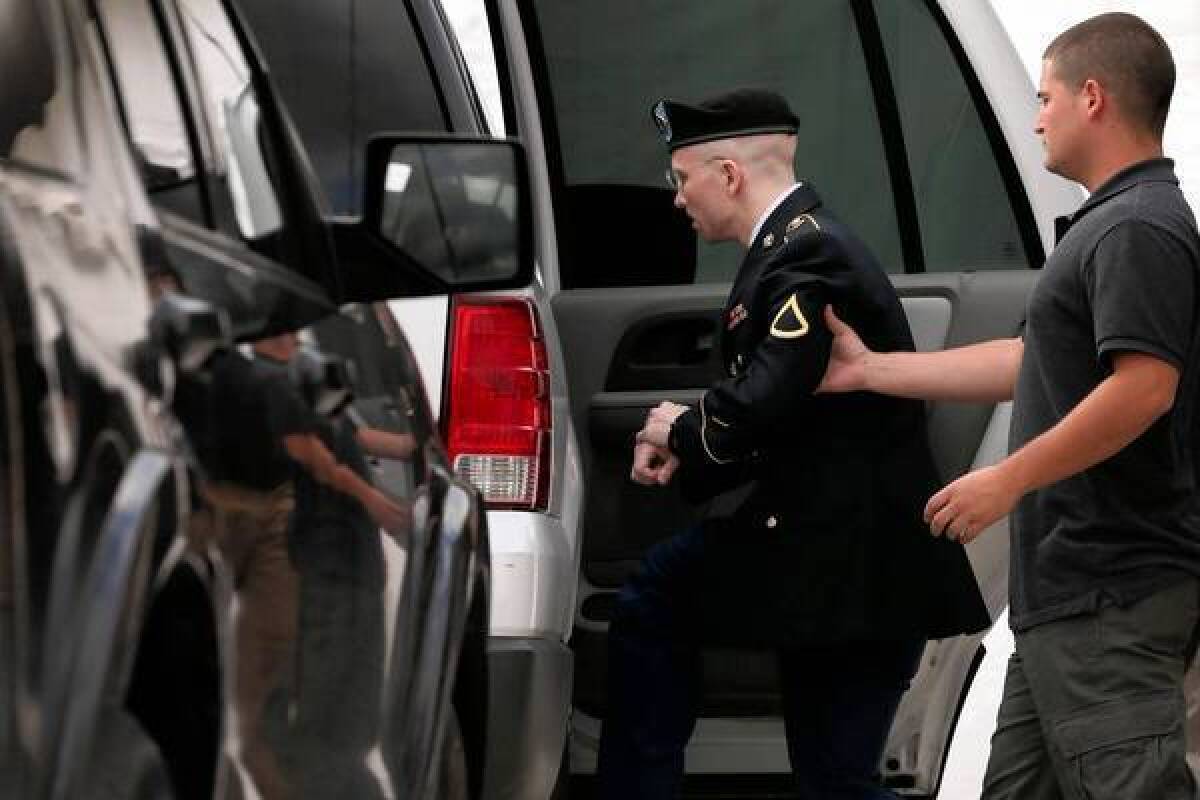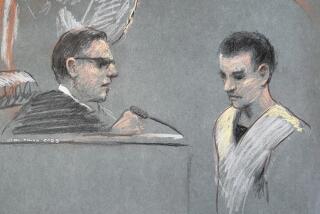Bradley Manning ‘not a naive soldier,’ prosecution says

- Share via
FT. MEADE, Md. — Bradley Manning purposely joined the Army and deployed to Iraq to parlay his extensive computer skills into disclosing a treasure trove of protected U.S. secrets that he knew would assist terrorist organizations in their efforts to attack the United States, the chief prosecutor in Manning’s military court-martial said Thursday.
“WikiLeaks was merely the platform that Pfc. Manning used to make sure all the information was available to the world, including the enemies of the United States,” Army Maj. Ashden Fein said in his closing argument near the end of Manning’s trial here. “Pfc. Manning deliberately disclosed compromised information to the world.”
Standing at the lectern in his dress blue uniform, flipping through page after page of his final summation, Fein recounted in sharp detail the heart of the government’s case — that Manning personally sought out WikiLeaks as his vehicle for exposing more than 700,000 combat videos, terrorism detainee assessments, State Department cables and other highly secret materials.
“He was not a naive soldier,” Fein said.
The prosecutor told the judge, Col. Denise Lind, that Manning spent untold hours transmitting documents to WikiLeaks and hours more chatting online with WikiLeaks founder Julian Assange and following his orders, and even more time “wiping” his computer clean thinking he could “hide his tracks.”
Many times late at night, Fein said, Manning sat alone in his unit’s intelligence-gathering hut southeast of Baghdad, with no fellow soldier sitting beside him as was normal, bending over the glow of his computer screen and thrilling at the prospect of his coming celebrity.
On the wall in the Ft. Meade courtroom, the prosecutor displayed a photograph the soldier took of himself, appearing “gleeful and grinning” after sending his first links to WikiLeaks. Manning signed the transmission, “Have a Good Day.”
“The only human Pfc. Manning ever cared about was himself,” Fein said. “He was interested in making a name for himself. The flag meant nothing to him.”
Begun in June, the trial now is nearing an end. Lind will decide whether Manning was a whistle-blower who bravely sought to enlighten the world about government misconduct, especially in Iraq and Afghanistan, or a traitor whose raw betrayal of the United States merits a sentence of life in prison with no parole.
The prosecution stressed that the 25-year-old from a small Oklahoma town committed espionage, endangered this country’s national security and aided organizations such as Al Qaeda that continue to plot terrorist strikes against the U.S.
Defense lawyers insist Manning was an ideological soldier upset with the horrors of war, and keen on alerting the public through journalistic channels that Washington had been misleading them. Their closing argument is to come Friday.
The government presented 160 documents and more than 80 witnesses. Perhaps most damaging were revelations that Manning not only underwent extensive training about the consequences of leaking classified data but also gave lessons to other soldiers warning them not to do it.
“He understood what he taught others,” said prosecutor Fein, adding that Manning knew releasing such information on the Internet would mean it would reach the hands of terrorists and other U.S. adversaries. “That’s why it’s called the World Wide Web,” he said.
Fein maintained that after Manning approached WikiLeaks and its founder, Assange, they closely collaborated to disclose more and more material. He described Assange as Manning’s cheerleader, urging him to provide more material, working with him to override secret passwords and other obstacles on classified documents.
Eventually, Fein said, Manning came to embrace Assange’s ideology against government secrecy. According to online chat conversations between the two men, Manning once told Assange: “Government agencies can’t control information.”
Manning also “doctored” some of the documents to make them appear worse, Fein said, such as when he edited a combat video of an Apache helicopter firing on civilians. “This reveals Pfc. Manning’s true nature. He put himself before his country,” Fein said.
And Manning knew full well how many eventually would see the U.S. secrets. “Osama bin Laden asked for some of the information himself, and he got it,” the prosecutor said. “It was in his hands the day he was killed.”
More to Read
Sign up for Essential California
The most important California stories and recommendations in your inbox every morning.
You may occasionally receive promotional content from the Los Angeles Times.












